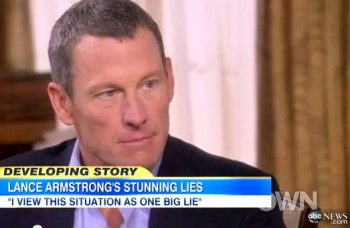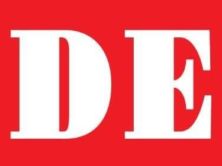
Lance Armstrong (Credit: YouTube, "abcnews," screenshot)
Lance Armstrong’s admission to doping didn’t just put his career as a cyclist in question — it also forced him to pay back a libel settlement from The Sunday Times.
Armstrong had sued the Times, its chief sports writer David Walsh and former deputy sports editor Alan English over Walsh’s 2004 book review that “questioned [Armstrong’s] repeated denials that he had taken performance-enhancing drugs.” In 2006, the Times settled with Armstrong for £300,000, Press Gazette reported.
After Armstrong said he wouldn’t continue with the US Anti-Doping Agency’s investigation into the accusations of drug use against him, the agency took away his Tour de France titles and banned him from racing, as iMediaEthics wrote at the time. In December, the Sunday Times filed a lawsuit against Armstrong to get the settlement back “plus interest as well as its costs in defending the case,” as iMediaEthics wrote.
The Times has now settled with Armstrong in its lawsuit for its libel settlement back, Press Gazette reports. While the details of the new settlement are “confidential,” the Times said it “reached a mutually acceptable final resolution to all claims against Lance Armstrong related to the 2012 High Court proceedings and are entirely happy with the agreed settlement,” according to Press Gazette.
The Sunday Times’ reporter, David Walsh, was awarded the Barclays Lifetime Achievement Award this year for his reporting on Armstrong, according to the Sunday Times. Beginning with Armstrong’s first Tour de France victory 14 years ago, Walsh “continued to question the success of Armstrong and plunged into a 13-year battle, which included a libel case and continuous threats,” as the Sunday Times reported.
In an interview earlier this year, Walsh said he was “looking for fairness” and that he expected Armstrong to have to “pay back more than one million pounds to the Sunday Times because of course he perjured himself,” Cycling News reported.
And, in Armstrong’s high-profile apology in a televised interview with Oprah Winfrey, Winfey brought up Walsh’s reporting and asked if he would apologize to Walsh. According to a transcript of the interview published by the BBC:
Winfrey: “[Do you owe )Sunday Times journalist] David Walsh an apology?”
Armstrong: “That’s a good question.”
Winfrey: “Do you owe David Walsh an apology, who for 13 years has pursued this story, who wrote for the Times, who has now written books about your story and about this entire process?”
Armstrong: “I’d apologise to David. I’ve had a couple of these conversations.”
Walsh never received an apology from Armstrong, he told iMediaEthics, ‘but I’m not bothered by that,” he said. “I haven’t asked for an apology and don’t need one.”
Further he said via email: “I never felt any need to be vindicated, not by USADA’s “Reasoned Decision” and not by the settlement of the dispute between The Sunday Times and Lance.”
Walsh went on:
“I knew what I knew more than ten years ago, fully understood that my chief witnesses Betsy Andreu, Emma O’Reilly and Stephen Swart were not lying and everything I did was justified by the fact that I was supporting those who were telling the truth and those who had lost their careers simply because they chose not to cheat. However, I am pleased The Sunday Times got their money back because they supported me at a time when many other newspapers and media outlets chose to look the other way.”
After Armstrong fessed up to doping, Walsh highlighted the impact of UK libel laws in stifling reporting. Walsh said, according to Australia’s ABC:
“At a time when the whole world was going with the Armstrong story, you had one newspaper in Britain repeatedly saying: we think this guy’s a fraud. Now the London, or the UK libel laws, shut us up, and lots of people have used UK libel laws to stop a story coming out because they are draconian, and journalists like me think they’re incredibly unfair.
“And so we were forced to settle with Armstrong, because we’d been the ones asking questions. Now, how unfair is that, given that history now shows we were the ones doing the right thing. Why should you be penalised for doing what I believe lots of newspapers and lots of TV channels should have been doing at this time?”





